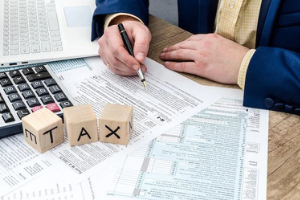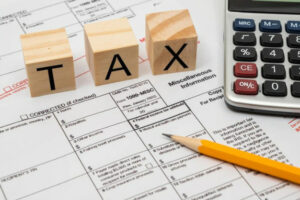VAT SERVICES IN
SAUDI ARABIA
Our VAT services in Saudi Arabia is part of our tax consultancy services in Saudi Arabia.
Value Added Tax (VAT) is an indirect tax on consumption or use of goods or services; it is applied across the stages of the supply chain, from when the manufacturer purchases raw materials until the retailer sells the good to the consumer. Registrants for VAT will collect the VAT applicable to their taxable activities from their customers and pay the tax collected to the authorities. Download the free KSA VAT invoice template.
Any natural and legal person who carry on an economic activity is subject to VAT and is required to register for VAT.
HOW IS VAT CALCULATED?
A retrospective test calculates the total value of supplies made by the taxable person at the end of a month inclusive of the previous 11 months.
While a prospective test calculates the total value of supplies expected to be made by the taxable person within the next 12 months.
However, it is the notion in the KSA, for example, that most taxpayers are expected to register on the basis of the retrospective test. Accordingly, the taxable person must apply to the authority within 30 days of the end of that month; and the registration will be effective from the start of the next month following the month in which the application is submitted.
CRITERIA FOR VAT REGISTRATION IN KSA
It is mandatory for all resident persons in KSA and whose annual taxable supplies over a 12-month period exceeds SAR 375,000 to register for VAT.
WHAT IS THE VAT RATE IN KSA?
VAT was first introduced to KSA on 1 January 2018; the initial VAT rate was 5% and the mandatory registration threshold was having a total value of taxable supplies of SAR 1,000,000 to register in VAT.
As at 1 January 2019, the threshold was revised and was set at SAR 375,000.
The VAT rate was revised on 1st July 2020 to 15%.
Exports of goods and services outside the council territory is exempt from VAT registration and considered “zero-rated supplies” even if the annual value of taxable supplies exceed the threshold.
WHEN IS VAT CHARGED?
Tax is due on whichever date comes first; the date the supply of goods and services take place, the date of the tax invoice, or when a partial or full receipt of consideration is made.
The above date determines in which Taxable period will the supply be reported; however, the payment of VAT by the supplier takes place only when a VAT return is filed.
A VAT return is filed each month for taxable persons with annual revenues more than SAR 40 million; or every three months for taxable persons with lower revenues.
List of Goods and Services subject to VAT:
List of Supplies on which 0% VAT is charged:
- Exports of Goods.
- Services supplied to non-GCC residents.
- International goods and passenger transport services.
- Supply of qualifying means of transport.
- Qualifying medicines and qualifying medical goods.
- The first supply, or supply for investment, of qualifying Metals (gold, silver or platinum).
WHEN IS INCOME NOT SUBJECT TO VAT?
Income is not subject to VAT if there has been no supply of goods or services made in return to the income received, such as the following:
- Dividend income received upon passive holding of shares.
- Freely given gifts (monetary or non-monetary value).
- Compensation payments.
- Wages, salary or other payments received under a contract of employment.
HOW TO IDENTIFY IF YOU ARE SUBJECT TO VAT?
- Is the supplier registered for KSA VAT?
- Is a supply of goods or services made?
- Is any (monetary or non-monetary) consideration payable for the supply?
- Is the supply taxable?
- Is the place of supply of goods or services in the KSA?
If your answer to all of the above is YES, and the supply is Not Zero-rated, then a VAT is charged.
HOW TO REGISTER FOR VAT?
Those who are subject to VAT are required to register with ZATCA which will issue a Tax Identification Number (TIN) to the taxable person. Once the VAT registration is reviewed and approved by the Authority, a VAT Registration Certificate will be provided to the taxable person.
The VAT Registration Certificate contains the following details: the name of the taxable person, VAT Account number and the effective registration date.
The taxable person is also required to display the VAT certificate at his business place and branches if any, at a visible place to the public.
Group Registration
Members of the same group of companies who are under the same ownership can register for VAT as a Tax Group and be treated as being a single taxable person.
In this case, a new TIN will be issued, and a combined VAT will be filed on behalf of the Tax Group. While goods or services supplied between group members is not considered for VAT and not reported on the VAT return. Each member of the group is however considered jointly liable for VAT debts and obligations of the entire group.
The following are the requisites to form a Tax Group:
- All group members must perform an Economic Activity.
- All group members must be legal persons who are residents of the Kingdom.
- All group members need to be subsidiary of the same shareholder, where the shareholder owns at least 50% or more of each of the group members.
- At least one group member must meet the annual taxable supplies threshold for VAT registration.
Legal Person with multiple branches, commercial registrations or international establishments
Branches of a legal person are deemed part of a single taxable person for VAT; a one VAT account number will be issued to the legal person.
- A legal person with multiple commercial registrations will be part of a single taxable person; a one VAT account number will be issued to the main commercial registration (“CR”) and will apply to all CRs for the purpose of VAT registration.
- A legal person with multiple establishments/associate or sister companies in different countries will have its VAT paid or collected at the country at which the transaction took place or is mostly associated with it.
- Goods and services provided from one branch, CR or establishments to another legal person of the same entity is not considered taxable supplies: and not subject to VAT.
Charges within the same legal entity are also not subject to VAT.
VAT RETURN FILING
VAT is collected throughout the value chain, and each company must account for its VAT payable or refundable at the time of filing its VAT return for the relevant VAT period. VAT is paid via a return form submitted to the Zakat, Tax and Customs Authority (ZATCA).
The volume of a business’s annual taxable supplies during the previous 12 months determines when it needs to start filing VAT returns and the frequency of its filing obligations.
Filing Frequency:
- Monthly: Taxpayers whose annual value of taxable supplies exceeds SAR 40 million are required to file VAT returns monthly, with a due date typically falling on the 28th day of the month following the end of the tax period.
- Quarterly: Taxpayers whose annual value of taxable supplies does not exceed SAR 40 million during the last 12 months have a filing frequency of quarterly.
VAT REFUND
Claiming a VAT Refund in Saudi Arabia. A Taxable Person may claim a refund of the amount of excess VAT paid under the following terms and conditions:
- Upon filing a Tax Return for a Tax Period where the Net Tax is an amount due to the Taxable Person,
- Where the Taxable Person has paid an amount over the Tax due,
- Where the Taxable Person has a VAT credit balance.
A Taxable Person may submit a request for a refund to the Zakat, Tax and Customs Authority (ZATCA) under any circumstances prescribed above, either at the time the Tax Return is filed or at any other time within five (5) years following the end of the calendar year for which the circumstances relate. However, a refund request may be rejected if there are any Tax Returns due and not submitted to ZATCA.
VAT AUDIT IN SAUDI ARABIA
The Zakat, Tax and Customs Authority (ZATCA) may assess the VAT obligations of a Person in respect of one or more Tax Periods. Notification shall be provided to the Taxable Person upon the issuance of such an assessment.
Generally, ZATCA may not issue or amend an assessment in respect of any Tax Period after a period of five (5) years has passed from the end of the calendar year in which the Tax Period falls. However, in specific cases where:
- Any transaction is conducted with the intention of breaching the provisions of the Law and these Regulations, or
- A Person is required to register for VAT but fails to do so,
ZATCA may issue or amend assessments up to a period of twenty (20) years from the end of the calendar year in which the Tax Period falls.
VAT HEALTH CHECK
A VAT health check is a comprehensive review and assessment of a business’s Value Added Tax (VAT) compliance, processes, and systems. This review is typically conducted by tax professionals or consultants with expertise in VAT regulations and requirements.
The purpose of a VAT health check is to identify any areas of non-compliance, inefficiency, or risk within the VAT framework of a business and to recommend solutions or improvements to address these issues.
During a VAT health check, various aspects of the business’s VAT processes and systems are examined, including:
- COMPLIANCE WITH VAT REGULATIONS: Ensures adherence to relevant VAT laws and regulations, including registration, invoicing, filing deadlines, and record-keeping.
- VAT ACCOUNTING AND REPORTING: Evaluates the accuracy and completeness of VAT accounting records to ensure proper calculation and reporting of VAT liabilities.
- VAT RECOVERY AND OPTIMIZATION: Analyzes eligibility for VAT recovery on expenses and identifies opportunities to maximize recovery through overlooked input VAT or available reliefs and exemptions.
- VAT RISK MANAGEMENT: Identifies and assesses potential areas of VAT risk, such as incorrect transaction treatment, exposure to penalties or audits, and compliance gaps, to mitigate risks and ensure compliance.
VAT DE-REGISTRATION IN SAUDI ARABIA: WHY AND WHEN YOU QUALIFY
VAT de-registration allows businesses to cancel their VAT registration with the Zakat, Tax and Customs Authority (ZATCA) under specific circumstances. This process can be initiated either by the taxpayer or by ZATCA itself.
REASONS FOR VAT DE-REGISTRATION:
ZATCA may deregister a taxpayer upon request in the following situations:
- Cessation of Economic Activity: If a business ceases to carry on any economic activity that generates taxable supplies in Dubai.
- Legal Entity Dissolution: If a legal entity that is a registered taxpayer ceases to exist.
- Non-Resident Taxpayer Inactivity: If a non-resident taxpayer has not made any taxable supplies in Dubai for a specific period.
ADDITIONAL CONSIDERATIONS:
Beyond these specific situations, businesses may also voluntarily deregister for VAT if their annual taxable supplies fall below a certain threshold (currently SAR 187,500) and are not expected to exceed that threshold in the next 30 days.
IMPORTANT NOTE:
It’s crucial to deregister for VAT within 20 business days of the event triggering the requirement.
ISSUING A TAX INVOICE
A tax invoice must be issued by a Taxable Person to another Taxable Person or a non-taxable legal person before the supply or payment for supply of taxable goods or services take place.
Tax invoices are either physical or electronic form (E-Invoicing).
A Tax E-Invoice can be an electronic copy of a paper invoice saved in a pdf file format for example or designed as a .CVS or .XML file designed for automatic transfer amongst systems.
Tax invoices are prepared either in a standard tax invoice or a simplified tax invoice based on some criteria including value of supplies.
- A standard tax invoice is required in the following circumstances:
- Taxable supplies of goods or services valued at SAR 1,000.
- Exports of goods.
- Zero-rated supplies valued at SAR 1,000 or more.
- Intra-GCC supplies.
- Nominal supplies.
- Supplies of eligible used goods charging VAT under the profit margin.
- A simplified tax invoice is issued in the following cases:
- Taxable supplies of goods or services (except exports of goods) valued at less than SAR 1,000.
- Taxable supplies made to a non-taxable natural person (other than exports of goods).
REQUIREMENTS OF A TAX INVOICE
- It is not mandatory for a tax invoice issued for VAT purpose to be signed or officially stamped.
- Information provided in the tax invoice need to be translated or shown in Arabic Language.
- Monetary values can be expressed in any currency.
- Amount of VAT charged must be in SAR.
PENALTIES
Violation of VAT requirements as set by Law or Implementing Regulations ranges from at least the amount of VAT due up to SAR 50,000 depending on the type of offense.
E-INVOICING
In May 2021, the ZATCA has published the e-invoicing resolution setting out the controls, requirements, technical specifications, and procedural rules covering the generation and integration phases, which includes VAT invoices, debit notes, and credit notes. A detailed set of requirements and guidelines were also published.
The generation phase was mandated from 4 December 2021, and the integration will be implemented in phases starting from 1 January 2023.
The ‘first wave’ of Phase 2 is applicable for those businesses with revenues exceeding SAR 3 billion (USD 800 million). The second wave of the project includes all VAT registered taxpayers having revenues exceeding SAR 500 million (USD 133 million) in 2021. These taxpayers are required to integrate their e-invoicing solution to the Fatoora portal by 1 July 2023.
VAT IN OTHER GCC COUNTRIES
- UAE
The UAE introduced VAT as from 1 Jan 2018. The standard rate of VAT is 5%, with certain transactions being exempted / zero-rated. VAT also applies to free zone companies, except for companies established in fenced customs free zones.
- Oman
VAT was introduced on 16th April 2021 and the standard VAT rate is 5%.
- Bahrain
A 10% VAT rate applies in Bahrain with effect from 1st January 2022.
- Kuwait
Due to inflation and oil price hikes, Kuwait has second thoughts on introducing a VAT at a rate of 5% in 2023; instead, it is exploring the possibility of imposing an excise or turnover tax on a limited range of supplies. - Qatar
There is no VAT imposed in Qatar yet; however, it is expected to be effective during 2023 at a 5% rate.












